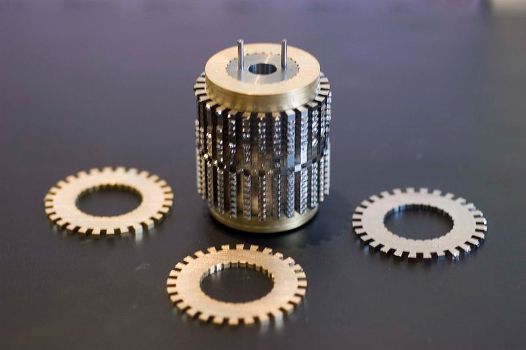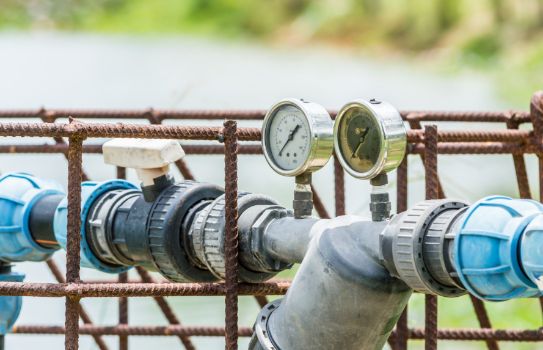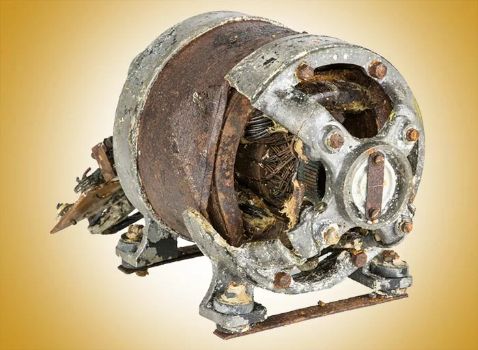Your well’s efficiency depends on how well the pump operates. When your pump makes loud bang or other noises, it is a sign of concern and must be addressed immediately.
Let’s check out the common reasons why a well pump makes loud noises and what you can do to fix it.
12 Reasons Why a Well Pump Makes Loud Noises
1.Clogging/Sediment Deposits
The most common cause of a pump making noise is clogging or sediment buildup. The rust and sediment particles in the water wear out the pump gradually, and it starts to make loud banging or grinding noises.
A clog in the water system immediately increases the water pressure, and the pump starts to short cycle. As a result, you hear loud bangs.
Solution
- Check your pump is receiving power; run it for 15-20 minutes and turn it off.
- Pull out the submersible pump from the well and check if it has sediment or rust deposits. It is a good idea to call over a professional if you are not comfortable working with a well pump. Moreover, pulling the pump yourself can risk water contamination, and some states only allow certified well professionals to make repairs.
- Clean any visible debris. Use a damp cloth and a wire brush to clean the screen and intake.
- Clean the pump with a gallon of diluted bleach before inserting it back into your well. This ensures all the bacteria are killed.
- Put the pump back in the well, switch it on, and see if the problem is fixed.
2.Worn Out Bearing Assemblies
All pumps with electric motors have bearing assemblies. A well pump with worn-out or damaged bearing assemblies often makes loud screeching noises.
Solution
Luckily, bearings for many models are available unless you have a pump that is no longer manufactured or aftermarket parts are unavailable. You’ll have to replace the pump in such a case.
The bearing issue must be addressed immediately to avoid damage to any other pump or well system part.
The bearing-replacement job is relatively easy but requires technical skills. It is better to contact the manufacturer or call a licensed technician.

3.Incorrect Pump Installation
Another common reason why a well pump makes loud noises is incorrect or faulty installation. The best way to prevent such problems is to get your pump installed by a well-reputed and experienced professional.
Solution
The only solution is to remove and re-install the pump. We suggest you call a professional for this task. A contractor will go through the following steps for re-installation.
- Turn off the power to the pump and ground the system.
- Remove the well pump and inspect it for any damages.
- Check if it is working correctly before reinstalling it.
- Insert the pump in the well and test it.
4.Cavitation
Cavitation happens when tiny water bubbles vaporize due to rapid changes in pressure. It leads to cavities on the impeller.
Cavitation is usually caused by low pressure at the pump’s suction end. The low pressure can happen due to pipe blockage, filter problems, and/or conditions not meeting net positive suction head pressure (NPSH) requirements.
Cavitation causes loud bangs or clicking noises from your pump.
Solution
You must hire a certified well professional to fix the problem. Cavitation can damage the entire well and other components in the well system. Hence, it is better to stop using the pump and get it inspected.
5.Wrong Pressure Setting
A wrong pressure setting on the well pump can force it to make loud banging sounds. The right pressure setting on the well depends on various factors such as the distance of your home from the well, the number of faucets and stories in your home.
A wrong pressure setting can also damage the pump, leading to frequent on/off cycling. It can negatively affect the working capacity of your pump.
Solution
Adjust the pressure setting on your well pump. The normal pressure setting is 20/40, 30/50, or 40/60, depending on different factors. You can consult your well drilling company for the right setting or arrange a visit to solve the problem.
Please note the air pressure in a well water tank must be 2-3 PSI less than the cut-on pressure setting on the well pump. If the pressure setting on the well pump is 40/60, the air pressure in the water tank must be 37-38 PSI.
Similar Guide: How to Prime a Well Water Pump?

6.Wrong Speed Settings
Some older well pumps come with speed settings. A wrong speed setting will force the pump to make hissing sounds.
Older pumps have two-speed settings. They can’t operate as efficiently as newer models, making loud sounds.
Solution
Adjust the pump speed by locating the flow switch. Turn the setting one step down and test if the problem has been fixed.
7.Damaged Impeller
Your well pump’s intake filter can wear out over time, allowing sand, silt, and debris from the aquifer to enter the well pump.
This sediment can damage your pump and force it to run louder than usual when pumping water. It makes a screeching noise. A failed impeller will not allow the pump to take in cold water, resulting in overheating and making loud noises.
Solution
- Immediately stop using the pump if you suspect a broken impeller. Turn off the pump and flush it. Disassemble the pump and clean all the accumulated debris.
- Replace the pump’s intake filter if it is damaged or has no filter.

8.Defective Pump Motor
The pump’s overall efficiency depends on how well its motor runs. A failing motor makes buzzing sounds, indicating that the pump fails to turn on.
Moreover, your home’s pressure will drop if the motor fails. A completely failed motor results in no water from the taps.
Solution
The only solution is to repair or replace the motor. In some cases, a new motor may be cheaper than repairing the old one. The task requires technical knowledge, so it is better to hire a professional.
9.Incorrect Pump Size
A wrongly sized pump will make loud screeching or banging noises while running. A small pump will fail to meet your home’s needs, and an oversize pump will be too big for the system.
Hence, they’ll not perform optimally and may go bad after some time.
Solution
Call a well professional and get your well inspected. The professional will likely recommend a pump replacement as per your home’s needs.
Read More: How Long Should A Well Water Pump Run?
10.Trapped Air
There are many reasons behind air in well-water lines.
Your well pump may allow air into the system through a leaking suction line or free-falling discharge. Whatever the reason behind the air in the well pump, it is not good for the pump’s health.
Air in well water lines can cause excessive vibration, loud banging noises, and pressure fluctuation.
Solution
It depends on the type of well pump installed at your home. Modern pumps have a built-in bleeder valve that allows the build-up air to flow out. Open the valve and let the air slip out; you will hear a hissing sound, followed by water splashes when all the air is removed. Close the valve and test the system.
Air in plumbing lines can be removed by running the faucets for 1-2 minutes. Please note that this is a temporary solution.
11.Water Hammering
A water hammer occurs when water pressure changes suddenly due to a pump tripping, starting suddenly, or a valve closing too quickly.
The sudden change in pressure sends a shock wave down the water lines, resulting in loud banging sounds.
Solution
A water hammer once in a while is nothing to worry about. Frequent water hammer sounds indicate a potential problem with your well system. It is best to call a professional and solve it as soon as possible.
12.Electrical Problems
Some users have reported that electrical problems can also result in loud hissing sounds from the pump. The pump may run optimally despite the short-circuiting.
The well pump may develop short-circuiting if it runs too hard due to plugged well screen, sediment, or excessive demand.
Solution
Such problems usually happen with older pumps. Call a professional and get the pump inspected. You may need to replace the pump if it is damaged beyond repair.
Different Types of Sounds a Pump Makes
Your well system may make different types of noises. Please note that any sound you hear that is not supposed to come is a sign of worry. Here are some common sounds a well pump or well system may make.
- Banging: It results due to water hammering, sudden pressure changes, or trapped air in the system.
- Clicking: Clicking sounds are mostly normal as they indicate the pump turning on and off. However, frequent clicking sounds mean something is wrong with the pump or pressure tank.
- Screeching: It indicates that the pump bearings have failed. Power off the pump instantly if you hear loud screeching noises.
- Humming: It indicates a leaking valve, or the system is running dry due to lack of water in the well.
- Clunking: It is also a common sound and indicates the pump’s cycling. If you hear a loud clunk when the pump starts, it can be caused due to a faulty pump relay, a broken check valve, or loose pipes.
- Knocking: Knocking sounds indicate worn-out valves that prevent the well system from functioning properly.
- Rattling: Rattling sounds from the pump indicate faulty assembly, debris in the pump, or a broken impeller.
- Grinding: Grinding sounds indicate cavitation in the well pump. Stop using your pump instantly to avoid any further damage.
Related Guide: Reasons Well Water Can Run Out[Natural, Manmade, & Maintenance]
Frequently Asked Questions
Can I DIY fix a well pump making loud noises?
Yes. You can DIY fix a well making loud noises, but it is better to call a certified professional if you don’t have the technical skillset. Well professionals know the local laws, can better diagnose the issue, and recommend the best solution.
Do I need to test my well water after repairing a well pump?
EPA recommends testing well water annually, after you notice a visible change in water quality or after well repairs. Hence, it is better to test your well after getting the well repaired.
Do I need to chlorinate my well after repairing the well?
It depends on the test results. If the tests show bacterial contamination, you must go for chlorination.
Why is my well running but not pumping water?
There can be various reasons behind this. The common ones include low water levels in the well, blockage in the pipe, high demand & low supply, wrong pressure tank settings, or your house being too far from the well. It is better to identify the reason before going for a well repair.
